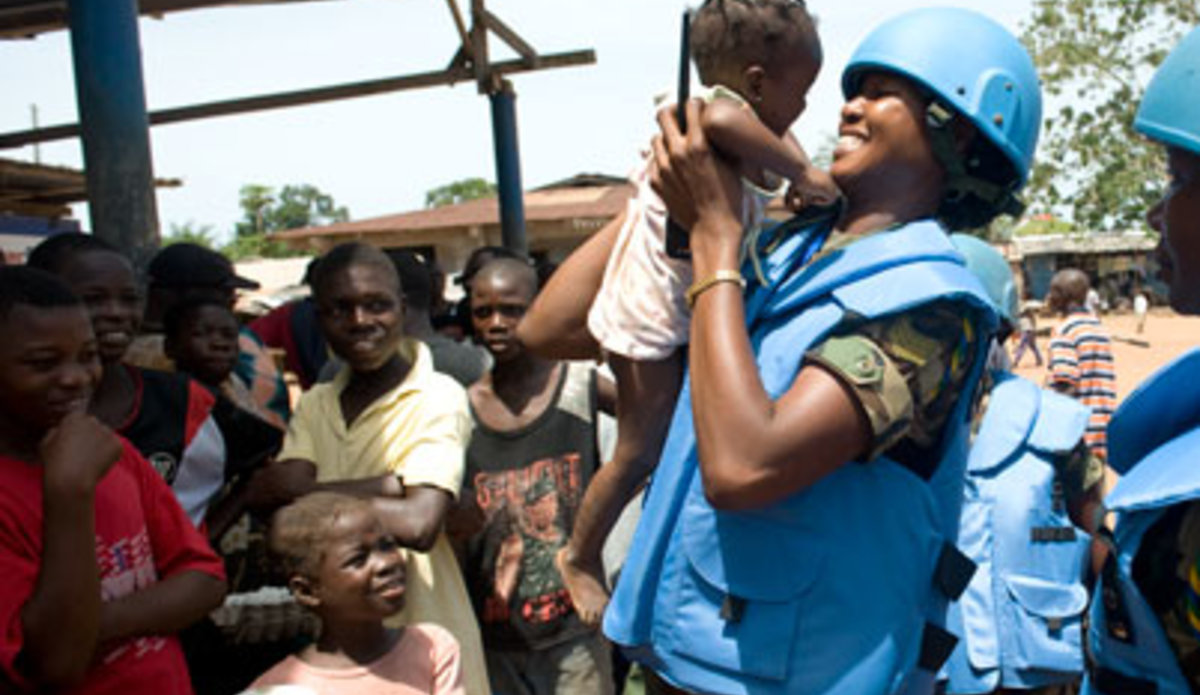“Helping Bring Peace…”
A wide-eyed 12th grade student, Christine Goethen, was among hundreds of school children in Monrovia, Liberia's capital, participating in this year's UN Day celebrations on 24 October. Asked about her presence, she said: "I am here because I want to thank the UN for helping bring peace and helping us to go to school."
Not too long ago going to school was not an option for a generation of Liberian children. The protracted civil war that began in 1989 and lasted until 2003 shattered the nation with most schools and other infrastructure destroyed. Several thousand people were killed and a third of the population displaced. Since the deployment of UN peacekeepers in October 2003 that brought an end to the civil conflict, Liberia has been treading steadily on the path to durable peace for the past nine years. Today ballots -- not bullets -- are the choice of the tiny West African country once stigmatized as a "failed" nation.
Among the largest peacekeeping missions in the world at one point, the UN Mission in Liberia (UNMIL) had over 15,000 peacekeepers and more than 1,100 police at its peak. With Liberia's first democratically elected post-war government inaugurated in early 2006, a phased-out reduction in troops through 2010 brought down the combined military and police strength to less than 9,000.
The second national elections too concluded peacefully in late 2011. And now into the tenth year of operations, UNMIL has been authorized by the UN Security Council in September to further reduce its military strength by some 4,200 peacekeepers -- in three phases until 2015. Simultaneously, there will be an increase of three Formed Police Units comprising 420 personnel. By the end of this transition phase in 2015, around 3,750 military personnel and over 1,750 police will still remain in Liberia.
The reduction in peacekeepers is predicated on the capacity of national authorities to take responsibility for the country's security. "The Mission is working closely with the Liberian National Police, the Bureau of Immigration and Naturalization, and other security agencies to ensure that they have sufficient capacity to assume full responsibility for Liberia's security," says Karin Landgren, Special Representative of the Secretary-General and Head of UNMIL. While praising Liberia's progress towards peace and democracy, the UN Envoy is quick to stress that the country's security and stability still remain "top priority" for the Mission.
A joint Transition Planning Working Group comprising UNMIL and the Government is looking into the transition roadmap against various challenges, particularly the nascent capabilities of the country's law enforcement and security agencies.
As security is the predominant concern in Liberia, as typical of any society that has suffered appalling trauma, the importance of law enforcement comes to the fore. The surge in the number of UN Police, while reducing the military strength, comes as a result of the critical need for the Liberia National Police to shape up into a professional and competent institution that can ensure security of the population. Liberia's Justice sector too needs to make significant progress to entrench rule of law in a society torn apart not too long ago.
Amidst other challenges, Liberia ought to create employment, especially for the youth, and bring about genuine reconciliation among the population. The unacceptably high rate of violence against women, including rape, predominantly of minors, remains a huge blot on the Liberian society. [See story: Page 12]
There are also challenges that are not of Liberia's own making. More than 65,000 Ivorian refugees, driven out by the post-election violence in neighbouring Côte d'Ivoire, are still graciously hosted by its neighbour. In 2010, that number exceeded 200,000. The sporadic security incidents in Côte d'Ivoire pose a significant border security challenge for Liberia. During one such incident in June, seven peacekeepers from Niger working for ONUCI, our sister mission in Côte d'Ivoire, lost their lives. UNMIL and ONUCI have strengthened mutual cooperation and are assisting both governments to enhance border security.
Amidst all this, Liberia is decidedly on the path to peace. The country is involved in a number of initiatives in collaboration with the Peacebuilding Commission. One importance of such an initiative is the concept of regional justice and security hubs spread across the country. One of the five planned hubs is soon to be functional in Gbarnga, Bong County. These hubs bring together police, courts and other related agencies in one place to provide citizens improved access to justice and security services.
Bringing peace to Liberia and helping children go to school, as student Goethen narrated, are among the dreams UNMIL peacekeepers have helped fulfill over the past nine years. The peacekeepers will have to leave one day but those dreams will still need to be nourished and protected.
 UN
UN United Nations Peacekeeping
United Nations Peacekeeping





